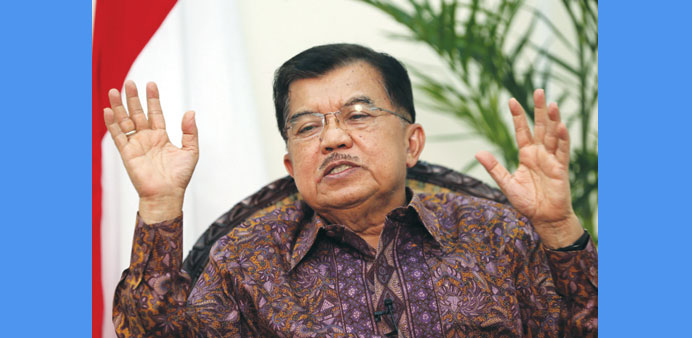Reuters/Jakarta
Indonesia’s central bank should cut its benchmark interest rate by up to 100 basis points, to 6.5%, by the end of this year, to help revive Southeast Asia’s largest economy, the country’s vice president told Reuters yesterday.
The central bank, which surprised markets last month by cutting its benchmark rate, kept its interest rate unchanged at 7.5% on Tuesday, saying the level was consistent with efforts to contain inflation and the current account deficit.
“This year, 7% would be OK, or 6.5 would be OK too, because you need more investment when the economy is slow,” Vice President Jusuf Kalla said in an interview. “If your interest rate is higher, then they are more likely to save.”
Kalla said Indonesia’s interest rate, the benchmark for determining the central bank’s deposit and lending facility rates, was much higher than other Asian countries and must be lowered gradually to as low as 5% to better compete with its neighbours.
The vice president said he and President Joko Widodo had regularly met top central bank officials over the past month, urging them to cut interest rates as inflation drops.
A cut in interest rates of that magnitude would likely pressure the rupiah, which is already at a near 17-year low, and spark an outflow of foreign funds.
The central bank has to also factor in the risk posed to Indonesia, along with some other emerging markets, once the Federal Reserve decides to raise US interest rates.
Asked whether Indonesia should lower interest rates if it led to further weakness in the rupiah, Kalla said: “Everyday we explain that the rupiah weakening is not because of our economy, but because the American economy is doing better and the US dollar is strengthening.”
Indonesia needs foreign investment to help fund its current account deficit. Kalla said the government prefers long-term foreign investment over portfolio funds.
President Widodo, who took office in October, wants to spur economic growth from a five-year low of 5% to 5.7% this year.
The public lobbying by Indonesia’s top two elected officials have raised questions about the independence of the central bank.
When asked about those concerns, Kalla replied, “Independent from what? Maybe independent from the minister of finance, but not independent from the state.”
Bank Indonesia spokesman Peter Jacobs declined to comment specifically on the vice president’s target for the benchmark interest rate, and instead noted the low level of another key rate.
“Other countries’ policy rate is the one directly affecting the overnight money market, which in our case is the deposit facility rate. It is already quite low at 5.5%,” Jacobs said.
Bank Indonesia Governor Agus Martowardojo has said that the government has not interfered with central bank monetary policy decisions.

Kalla: Urging central bank to cut rates to revive the economy.
